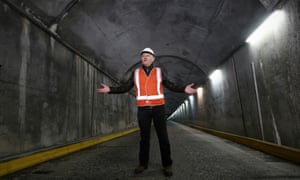Extract from The Guardian
Market shift to renewables means scheme’s economic case stacks up, senators told
The head of the government’s Snowy 2.0 project says the expanded scheme would be able to “out-compete” any new coal-fired power.
Snowy Hydro’s managing director and chief executive, Paul Broad, told a Senate estimates hearing on Tuesday the project would perform better than any new coal plants, including those being pushed for by government backbenchers , because of the increasing market shift toward renewables.
“We will out-compete any new coal plant, no subsidies, no government guarantees, nothing,” he told the hearing. “We will out-compete them on price and reliability as the markets unfold.”
Earlier this year Broad’s colleague and the Snowy Hydro chief operating officer, Roger Whitby, told an estimates hearings that adding new coal-fired power to the energy market would jeopardise the viability of Snowy 2.0.
Broad himself told Sky News last December that just three new coal-fired power stations would be enough to undermine the economic case for the project.
But under questioning from the Labor senator Kristina Keneally on Tuesday, Broad said he no longer stood by those remarks.
“The price we’re getting for wind and solar has come down by an order of magnitude,” he said. “As the market moves, you’ve got to readjust your sights.
“We think strongly that the move has happened to the point where the investment stands alone and that the economics for us with renewables now works.”
He added that he thought the scheme could “out-compete a new HELE (high-efficiency, low-emissions) plant today.”
Keneally asked if Broad was suggesting that a new coal-fired power plant would be economically unviable. “That’s what I’m suggesting,” he said.
But Broad told the hearing that the viability of the 2.0 scheme still depended on more existing baseload power exiting the energy market.
When the Liddell, Vales Point and Eraring power plants closed by 2030 and were replaced by renewables or gas, he said, the Snowy Hydro would be working at its capacity.
“The amount of baseload that comes out of the market determines the viability or not of 2.0,” he said.
Labor’s climate change and energy spokesman, Mark Butler, said Broad’s comments showed it was inconsistent for the government to support Snowy 2.0 “but have a national energy guarantee whose emissions reduction ambition will result in no large-scale renewables built for the entirety of the 2020s”.
“Mr Broad was clear that Snowy 2.0 only stacks up as we transition to ‘a world that’s different’ with a new clean, reliable and affordable renewable energy system,” Butler said.
Snowy Hydro’s managing director and chief executive, Paul Broad, told a Senate estimates hearing on Tuesday the project would perform better than any new coal plants, including those being pushed for by government backbenchers , because of the increasing market shift toward renewables.
“We will out-compete any new coal plant, no subsidies, no government guarantees, nothing,” he told the hearing. “We will out-compete them on price and reliability as the markets unfold.”
Earlier this year Broad’s colleague and the Snowy Hydro chief operating officer, Roger Whitby, told an estimates hearings that adding new coal-fired power to the energy market would jeopardise the viability of Snowy 2.0.
Broad himself told Sky News last December that just three new coal-fired power stations would be enough to undermine the economic case for the project.
But under questioning from the Labor senator Kristina Keneally on Tuesday, Broad said he no longer stood by those remarks.
“The price we’re getting for wind and solar has come down by an order of magnitude,” he said. “As the market moves, you’ve got to readjust your sights.
“We think strongly that the move has happened to the point where the investment stands alone and that the economics for us with renewables now works.”
He added that he thought the scheme could “out-compete a new HELE (high-efficiency, low-emissions) plant today.”
Keneally asked if Broad was suggesting that a new coal-fired power plant would be economically unviable. “That’s what I’m suggesting,” he said.
But Broad told the hearing that the viability of the 2.0 scheme still depended on more existing baseload power exiting the energy market.
When the Liddell, Vales Point and Eraring power plants closed by 2030 and were replaced by renewables or gas, he said, the Snowy Hydro would be working at its capacity.
“The amount of baseload that comes out of the market determines the viability or not of 2.0,” he said.
Labor’s climate change and energy spokesman, Mark Butler, said Broad’s comments showed it was inconsistent for the government to support Snowy 2.0 “but have a national energy guarantee whose emissions reduction ambition will result in no large-scale renewables built for the entirety of the 2020s”.
“Mr Broad was clear that Snowy 2.0 only stacks up as we transition to ‘a world that’s different’ with a new clean, reliable and affordable renewable energy system,” Butler said.

No comments:
Post a Comment